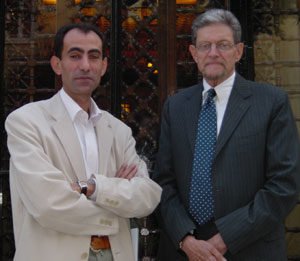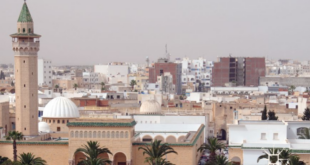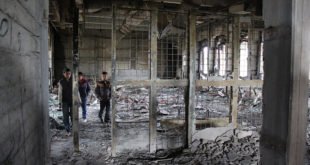
Fouda: I think one way of looking at this is perhaps by looking at the Arab reality itself. The popular level of awareness has changed since the launch of Al Jazeera. In the beginning, Al Jazeera had a huge pond all to itself to fish in. It would have been very difficult for it to go wrong, because everywhere it went—as a news seeking organization, out in the field—it could not but be a success, given Al Jazeera's news philosophy—to be free from government directives or influence, to be balanced (fair minded), to be detached from the event. I think the viewers realized that Al Jazeera was different.
TBS: What has been the biggest change for Al Jazeera since it was first launched?
Fouda: The only difference now that I can see when comparing 1996 to 2003 is the audience. Now Al Jazeera has opened our eyes to a few things, given us a chance to voice our feelings; that I think is the biggest challenge that faces Al Jazeera at this point of history. I do think that our people in Al Jazeera realize this, as well as the competition, Abu Dhabi TV, Al Arabiya.
TBS: What is the basis for competition amongst the big media players?
|
Fouda: There are the fundamentals and they will always be there, the belief in the absolute professionalism. Al Arabiya has probably surpassed Abu Dhabi TV in terms of giving the news in a balanced, objective way. In comparison to Al Jazeera, I would place Al Arabiya higher in terms of the presentation, the caliber of the people, and so on. Yet there is something different, philosophically speaking, that makes Al Arabiya revolve within the old philosophy. I'm referring to the way Al Arabiya handles things that happen in the Arab world, particularly those that affect Saudi Arabia.
TBS: Could the same be said about Qatar, and Al Jazeera? Of course Qatar doesn't generate the funding for Al Jazeera that even approximnates the funding for Al Arabiya/MBC, so perhaps the cross you bear is made of aluminum while Al Arabiya's is made of gold?
Fouda: But again not to look or sound patronizing to Qataris or antagonistic to Saudis, Al Jazeera has a certain nature—we believe absolutely in freedom of speech. Audiences will realize that for themselves. But some of the flagship programs of Al Jazeera still seem to be acting out a stance of condescending maturity, speaking to the mind rather than the heart, maintaining the patronizing tone of the older style of broadcasting and telling the audience only what it wants to hear. So I'm a little bit concerned about Al Jazeera and I'm worried that they are stuck. It's partly linked to the flexibility of Al Jazeera, in which the live interview shows are on their own, not reporting back to a higher level of editorial management.
TBS: Well I think you also have problems with your anchors and not just with live talk shows. Here is an example I caught during the Iraq War. Suddenly there's a report that a squadron of Iraqi tanks has broken out of the British siege of Basra. Who knows where they're moving to? Who knows where they are going? All you can report is Coalition forces have reported that a significant number of Iraqi army tanks have rolled out of Basra. The Al Jazeera anchor adds to that, saying they are on their way to recapture Umm Qasr. Sounded like wishful thinking and not detached journalism to me.
Fouda: Oh my God. Probably it was live. Only with things like this can you differentiate a good news anchor from a bad one. But when it is a written script it has to be approved.
TBS: Same on BBC. It ran this report on how Saudi security is moving against al Qaeda. The Saudis had allowed a BBC reporter in to cover this action. He makes the point half way through his piece that the Saudis are taking this action on their own initiative and not because of any pressure from America. But in leading in to the story the anchor says something to the effect "Here we have a BBC exclusive report on a Saudi Arabian crackdown on Al Qaeda, taken no doubt in response to pressure from America." As if she hadn't even listened to the piece before writing her lead-in.
Fouda: This I would call naivety. Lack of professionalism. It happens a lot on live events, which are very popular because they have their own aroma for the audience. But if you don't know it enough, you would be tempted to fill the air with rubbish. There is a limit; it's some sort of an unwritten contract between the anchor, the journalist, and audience that when we go live there is a level of forgiveness. Yet even that is not an absolute right to say what you want.
TBS: Let's get back to your point about the dangers of Al Jazeera live talk shows not reporting to a higher level of editorial management.
Fouda: That element—giving all freedom to the program makers—has its positive and negative sides. It could be heaven for some or hell for others who might like to abuse it, intentionally or unintentionally.
TBS: I asked you when you attended one of my classes at the American University in Cairo the other day, "Why is it that I'm so impressed by the Al Jazeera Washington bureau's operation in contrast to stuff coming out of Qatar?"
Fouda: I don't think it has got to do with the place, I think it has got to do with who makes the program. But some of them don't know what it means for journalists to handle the structural requirements of a talk or interview show professionally. They get flattered by the immediate success of their talk shows. What makes this so critical is the lack of a real independent survey that could be a corrective. I've come across a lot of people that say some talk shows on Al Jazeera have lost credibility. You can also see this through the caliber of people who take part in this show. In the beginning you had higher caliber people who would come on air as guests but now many decline to go on some of the shows, particularly on those shows which confuse shouting matches for debate.
Another thing is what has happened to the Arab audience. Now that they have gotten used to picking up the phone, they are going to be more interested in the content. Over time, the glamour of Al Jazeera has decreased. I predicted this. It's something you can't do anything about. But there are other things we can do, like inject new blood into Al Jazeera, introduce new programs, do a review. They are now introducing a host of new programs. I look at the existence of Al Arabiya and Abu Dhabi as good news for Al Jazeera. It can get people out of what is sometimes their arrogance, complacency. It's changing. Like I said before, I don't assess Al Jazeera just on the basis of what it puts up on its own screens, but on what it's forced others to have on theirs. That is the ultimate success for Al Jazeera.
Lately Al Jazeera has started to realize that news is partly entertainment. Even if you tell someone to stand up and give a report, it's presentation. It is primarily entertainment. And if, in the back of this, you can inform the audience, it's a plus.
TBS: What about your own show, Sirri lil-Ghaya ("Top Secret")?
Fouda: I think there is a lot of room for many programs like mine to tackle issues that need to be investigated or clarified. Unfortunately this part of the world has been very secretive, a number of things have been dealt with behind the scenes and in a not very transparent way. This area of the world is not used to investigative journalism, it is very suspicious. But I think the Arab world needs many more of these shows and the Arab audience would absolutely accept them.
TBS: I remember an interview you did with our former managing editor, Sarah Sullivan , sitting in a caf� in Paris, and she mentioned how she was overwhelmed by the endless stream of Arabs in Paris who would stop by to welcome you and congratulate you for your show.
Fouda: To tell you the truth, I'm on the screen only four times a year and what makes me feel good about my own people more than about my program is that it interests them. I am giving people just what our authorities tell us is not what the people want or need. So this is what makes me happy.
TBS: Ultimately it could be suggested that if satellite television is to move another step forward it must become economically viable. Al Jazeera follows the BBC model—public sector money and autonomy. But you could argue in the end if it is going to take another step forward, if it is to be viable whether on a BBC or a private-sector model, there must be a free market. From a political point of view, a market creates less dependence on vested interests if only because no one sponsor has a monopoly position, unlike relying on government financing. But how can anyone hope that you are going to have a substantial market, given the over-saturation of the market, the amount of competition, which by now may be self-defeating ?
Fouda: In general I don't believe in complete ideal independence. There is always some kind of force that exerts itself from the other, depending on many factors. In this part of the world, there are so many different factors that come into play. Perhaps the Lebanese model is the most sophisticated one. On one hand, there is Future but that means the obligations of Rafiq al Hariri [owner of Future TV, prime minister of Lebanon, and close ally of Saudi Arabia-editor]. Or Al Manar and its ties with Hizbolla. So when it comes to Al Jazeera, it has to be one of the best models.
TBS: But on the other hand, LBC, which started as a militia channel has transcended its militia origins and has achieved great popularity.
Fouda: Yes, But you can become popular by becoming really unprofessional or by being tasteless, and everyone will watch you. I believe that LBC is a variety channel, so anyway this is another issue.
TBS: So you believe it is possible to be a publicly funded service like BBC or PBS without being simply a state run operation like what we call the "national channels"?
Fouda: People need to be educated. And this function of a news channel becomes very important. Al Jazeera has done this. For example, for the first time a Bedouin in the desert in Jordan hears about political participation, human rights, and women's rights. An American may see this as nothing new, but here they might push for more media outlets, they might push for institutions to run more efficiently. Al Jazeera has just started the ball rolling. Civil societies have become more encouraged to speak their mind. If a guy gets arrested he might know that Al Jazeera might cover it. It comes as no surprise to me that American policy gave Al Jazeera a lot of attention. That Al Jazeera is considered in the run up to any event in the West is amazing. People consider Al Jazeera because they know it will have a role on the ground. Don't forget one frightening fact, that more than half the Arabs can't read or write, which gives television more responsibility.
TBS: You originally wanted to have your own talk show?
Fouda: I wanted to have a different format; I wanted to combine other things with TV. I do believe that TV is a vast medium and if you don't use everything that it can offer, then you lose a lot. I will always be a field man. I think I might just change the format of my existing show but at the same time be on the cutting edge side of investigative journalism. Now because of its success, I have more people working on the show, more space, and more quality. This evening and next Thursday I'm doing something on the 73 war. And frankly I expect some backlash from the Egyptian press.
 Arab Media & Society The Arab Media Hub
Arab Media & Society The Arab Media Hub




